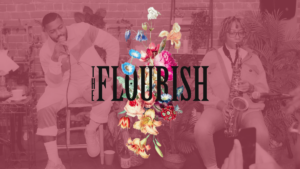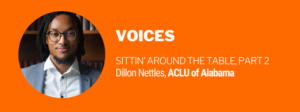My period as a music major at Birmingham-Southern College lasted about one week. After my first music theory course with Dr. Hindman, I realized I was in way over my head. My roommate at the time – now music professor Dr. Matthew Taylor – had tried to warn me. But I figured, “I’m Black. I’m from Montgomery. I was a Marching Poet. Most of my friends make music. I got this.” I didn’t.
So I dropped that music theory class, and changed my major. I kept my choir elective though. For auditory learners like me, music can be a grounding cable. I needed that grounding in this new whiter, wealthier BSC environment. Choir helped me stay connected to my own creative roots and also helped me better understand the cultural complexities of my classmates. It was one thing to see Walker Hayes end every Thursday night dancing to Afroman with his brothers in front of the Theta Chi fraternity house. It’s another to embody an ancient song’s emotional core as most beloved choral songs ask of their performers.
Birmingham-Southern’s premier choral group is the concert choir. A small number of non-music majors join its ranks. Thanks to the baritone chops I inherited from my Dad, I eventually made the cut, and appreciated that I was being allowed a peek into a training space reserved for aspiring pro-musicians. It felt like walking on to a college football team. A stacked one at that. Matt. Kirstin Anderson. Nat Gunter. John-Mark McGaha. I was in awe of them individually. But as a team, what couldn’t they…we do?
In 2002, Dr. Lester Seigel, the Nick Saban of the Music Department, booked composer Eric Whitacre for a series of performances. Whitacre was entering the Thank Me Later phase of a Drake-level reign in modern choral music. In anticipation of his visit, our choir learned several of his songs, including “When David Heard”, a piece written about the heartbreaking moment described in 2 Samuel 18:33 when David, the King of Israel, learns that his adversary and son Absalom has been killed in battle.
This song captures the complexity of grief, military victory, and regret by using restrained quiet and surging monster chords to evoke primal emotion. The song asks its performers to embody feelings related to unreconciled family trauma and deep loss. It’s a heartbreaking piece, and one that requires a humbling amount of work, even for our all star bunch. Whitacre ultimately conducted us in a performance of his song, and at the end, when he mouthed, “Thank you,” it felt like we’d collectively earned a rare trophy.
Almost twenty years later, I sat in a performance space of a different sort. The United States Supreme Court. My co-plaintiffs and I were there to hear oral arguments for a lawsuit we brought against the State of Alabama. We argued that the state created a congressional voting district map that unjustifiably diluted the voting strength of Black Alabamians, thereby violating Section 2 of the federal Voting Rights Act.
While our lawyers and the United States Solicitor General argued on our behalf, another BSC alum (Alabama Solicitor General Edmund LaCour) argued against us.
In this instance, the influence of Birmingham-Southern on this moment in American history can’t be overstated. If the Court sides with one BSC graduate’s argument, our country preserves the last remaining enforcement prong within federal legislation that limits voting rights discrimination on the basis of race. If the Court sides with another BSC graduate’s argument, then we very likely will lose that prong, and close the book on the 1965 Voting Rights Act.
I feel indebted to BSC for helping to prepare me for public service vocation. I’d bet that despite our differences in many regards, Mr. LaCour feels the same. During the Class of 2003’s Baccalaureate service, the late-Bishop Robert Morgan encouraged us to embrace the glory of failure as a humble path towards a fulfilled life.
Doing advocacy work here in Alabama for over twenty years, Morgan’s words and Whitacre’s song are never far from mind. Clients leave Alabama’s uniquely overcrowded and violent prisons only to find an opiate epidemic waiting to embrace them. Mentees are turned out by the streets. Mentors are abandoned or betrayed by organizations and movements they helped build. Most of our legislators ignore bipartisan arguments for humane policies like expanded Medicaid coverage or pay-day loan regulation.
More personally, while consumed by the redistricting outreach work that led to my involvement in Allen v. Milligan, I failed to be fully present for my medically compromised father when he was least able to advocate for himself. A few days after his hospitalization for what we were told was a fairly mild concern, my family gathered around him to say goodbye. The fact that a notable Supreme Court case now bears his name is not consolation.
On the front end of choosing to embrace this vocation, I thought, “I got this.”
I didn’t. I don’t.
And several of the institutions that shaped my life are in even more danger of slipping away now than when I first stepped on the Freedom Trail. The Voting Rights Act and American civil society more broadly. The United Methodist Church. Birmingham-Southern College. Each at a precipice, threatened with falling, challenged to fly.
Fortunately, public service is neither a solo act nor a process defined by one moment. Voices rise as others fall. Surging victory is tempered by the quietness of deep loss. Dissonant oppression fades into moments of harmony so beautiful that bitter adversaries are inspired to believe in the promise of shared freedom. And my individual failures and talents will blend into the chorus surrounding me, perhaps motivating someone else to join the song.
It’s possible that our state legislature will provide the ARPA money BSC needs to remain open. Our state has many needs that will take decades to sort out. A legislature concerned about the state’s future would prioritize incentivizing public-service-oriented young people to plant roots here. BSC has a strong track record of doing this. Given the scale of funding appropriated to Alabama by the Biden administration, it’s also possible to make similar investments in our HBCUs and community colleges. Hopefully – where relevant – the same grace regarding the fiscal mismanagement of prior executives that some are extending to BSC can be extended to those other institutions as well.
I have more measured hopes about the fate of the Voting Rights Act. The members of the Court who are most agitated by anti-discrimination protections hold a majority vote. Whether in our case or another, they will exercise their majority. The most pressing tasks democracy advocates face involve inspiring our neighbors to secure the federal constitutional amendment and state/federal legislation needed to change the nature of the voting rights cases even being sent before the Court.
Social movements capable of achieving this level of sustained inspiration are often built on the foundation of many failed attempts. The odds are against me being on the winning side of this long struggle. But I’ll keep singing along with those interested in the survival of the most diverse democracy the world has yet known. Despite how heartbreaking this democracy song might be, there are pockets of sublime unity that keep calling me back to it, along with the hope that we’ll earn the quiet thanks of our grandchildren who commit themselves to learning this song, too.



